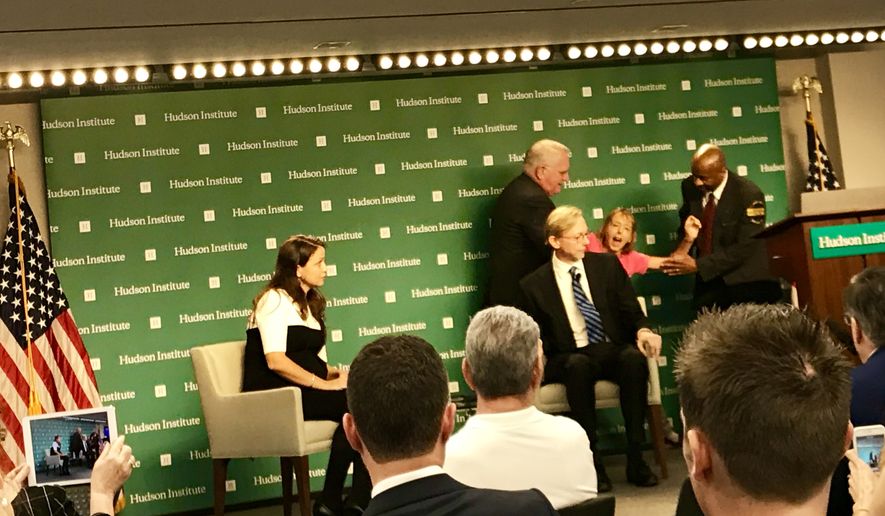The White House is knuckling down on efforts to convince the world to stop all purchases of Iranian oil by early November, according to the Trump administration’s top Iran strategist, who says the hope is that a new era of U.S.-led economic isolation will force Tehran back to the negotiating table with Washington.
“We intend to get global Iranian crude oil imports as close to zero as possible by November 4th,” newly appointed Special Representative for Iran Brian Hook told the audience at an event that was briefly disrupted Wednesday morning by an anti-war activist at the Hudson Institute think tank in Washington.
With the activist removed, Mr. Hook went on to argue that the mounting re-imposition of U.S. sanctions against Iran have a long-term purpose.
“We believe that Iran tends to come to the negotiating table once they feel the pressure,” he said, stressing that President Trump’s goal in withdrawing from the 2015 Iranian nuclear deal was to steer Tehran toward accepting a new “treaty” that goes far beyond what the former Obama administration accepted from Tehran in exchange for sanctions relief three years ago.
Similar to the way the Obama administration used a global embargo on Iranian crude in the 2012 through 2014 time-frame to pressure Tehran into talks then, Mr. Hook suggested the current White House is banking on the strategy working again this time around.
But it remains to be seen whether the Trump administration will be able to convince such world powers as China and India to go along with a new embargo. Both depend heavily on crude purchases from Iran and both have expressed little interest in cutting their imports.
Mr. Hook sidestepped the issue Wednesday. Instead, he focused on defending Mr. Trump’s decision earlier this year to pull out of the Obama-era nuclear accord, saying the current White House simply couldn’t live with a deal that failed to address Iran’s support for militarized proxies around the Mideast and, especially, its ongoing ballistic missile activities.
“Ballistic missiles are the most likely way that Iran would deliver a nuclear warhead [and] this administration has been firm on its position that the nuclear issue has to be addressed together with Iran’s missile proliferation,” said Mr. Hook, who claimed Tehran is currently spreading ballistic missiles to proxy militias in Iraq in Yemen.
He said reliable evidence showed projectiles fired recently into Saudi Arabia by Iran-backed Houthi rebels in Yemen were ballistic missiles supplied by the Iranian military.
“Iran has the largest ballistic missile force in the Middle East with more than 10 ballistic missile systems in its inventory or in development,” Mr. Hook said. “It’s ballistic missile program remains among the most significant challenges to broader nonproliferation efforts in the region and its an enduring threat to our allies and partners, including Israel.”
He went on to criticize the former Obama administration for hoping sanctions relief in exchange for limits to Iran’s nuclear activities under the 2015 deal would inspire Tehran to embrace a less militarized regional policy and tamp down its ballistic missile activities.
“The Iran nuclear deal was premised in part under the flawed premise that this sort of relief would moderate the regime and unfortunately we’ve seen the opposite,” Mr. Hook said. “Far from constraining Iran’s regional activities, we have seen an acceleration of those activities.”
“Iran’s pace of development [of ballistic missiles] did not diminish after the deal went into effect,” he added, pointing to other activities by Tehran as well, including its alleged backing of malign cyber attacks to its recent threats to choke off the strategic Strait of Hormuz.
The Trump administration’s “new strategy,” said Mr. Hook, is to reach a “new deal” that addresses the “totality of threats that Iran presents.”
Such comments have spurred speculation over the prospect of a behind-the-scenes meeting between Iranian and Trump administration officials on the sidelines of next week’s U.N. General Assembly in New York.
Mr. Hook said any new deal with Iran must be a “treaty” that gets ratified by the U.S. Senate. He asserted that the Obama-era deal failed in part because it was only an administration-level agreement.
“They did not have the votes in the U.S. Senate and so they found the votes in the U.N. Security Council and that’s insufficient in our system of government if you want to have something enduring and sustainable,” he said. “That’s why we have called for a treaty.”
Anti-war interruption
Mr. Hook’s remarks at the Hudson Institute were briefly interrupted by a female protester wearing a pink shirt who rushed the stage early in the event shouting anti-war slogans.
Organizers later said the woman, who was not identified, was a member of the “Code Pink” activist organization that is known for making headlines by disrupting congressional hearings in Washington.
“Do you think these sanctions are hurting the Iranian regime or hurting the Iranian people?” the woman yelled. “You’re making a case for war with Iran. How did the Iraq war turn out? We don’t want another war in the Middle East!”
When she was quickly surrounded by security, she added: “You’re hurting me! You’re actually hurting me.”
Someone from the audience then shouted: “You’re hurting yourself.”
The protester was peacefully ushered from the room and the event proceeded as planned.
• Guy Taylor can be reached at gtaylor@washingtontimes.com.




Please read our comment policy before commenting.